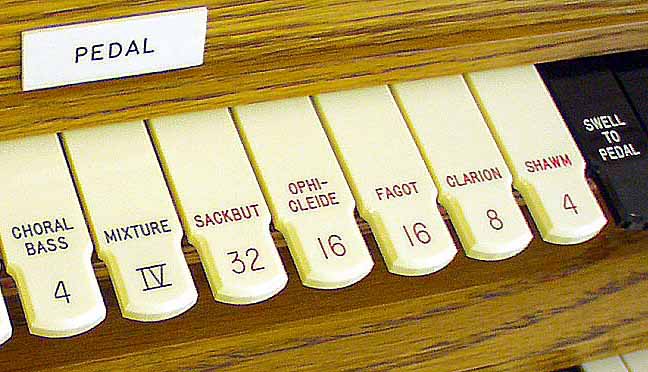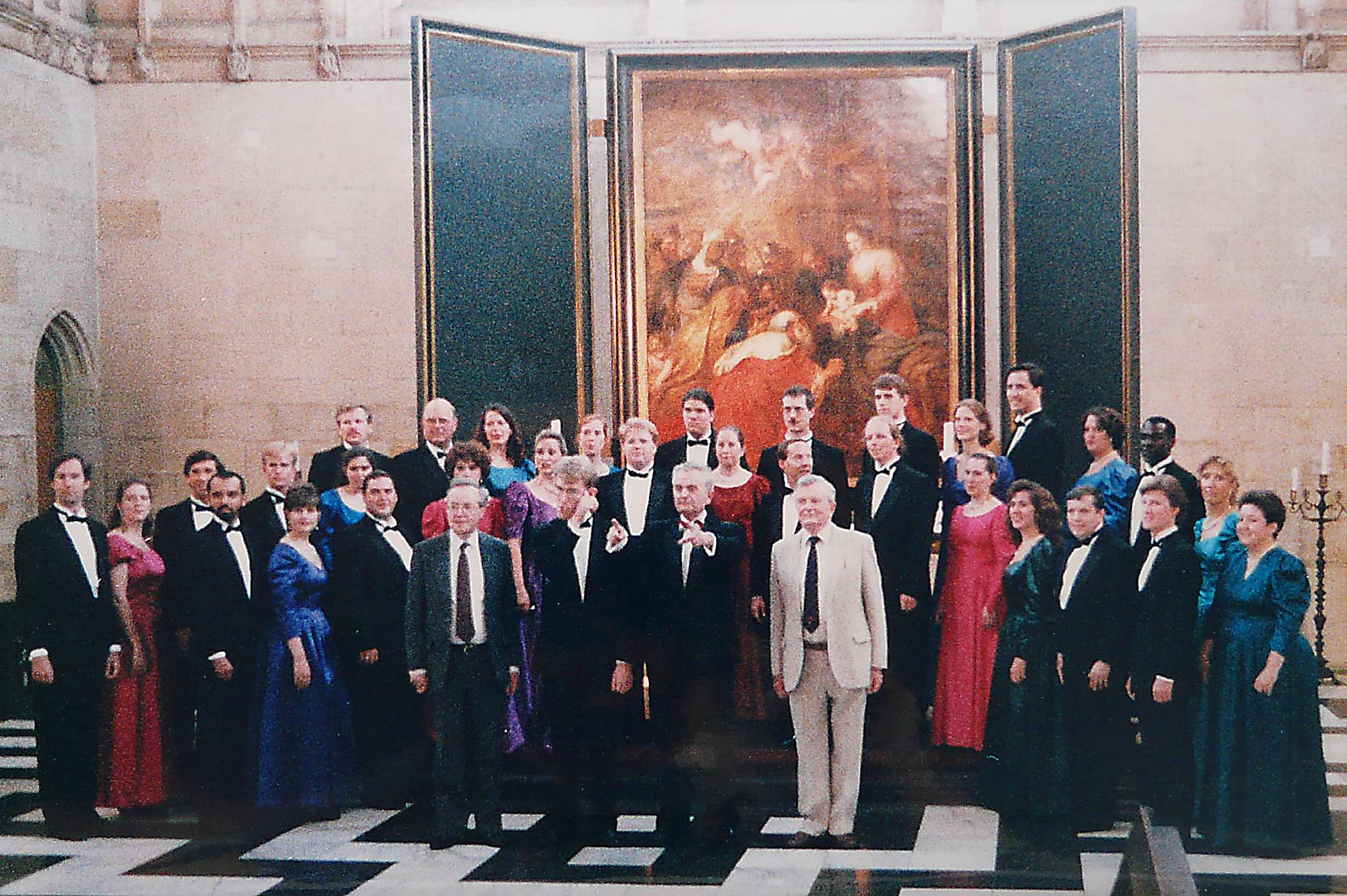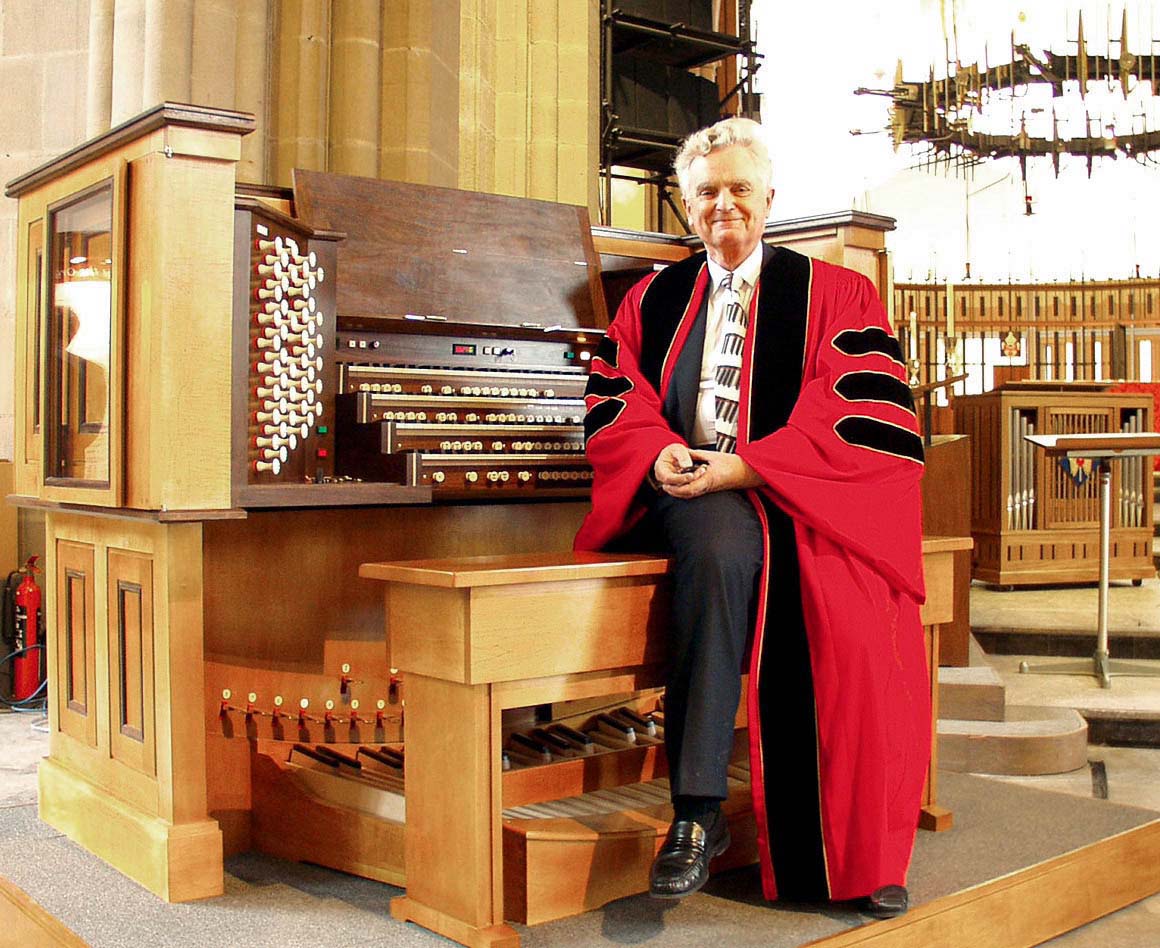How to transform your choir
and fill your stalls
with enthusiastic singers
14 A Life-changing traumatic experience

by Dr John Bertalot
Organist Emeritus, St Matthew's Church, Northampton
Cathedral Organist Emeritus, Blackburn Cathedral
Director of Music Emeritus, Trinity Episcopal Church, Princeton, NJ, USA
How keen is your choir?
What do you think of your choir – both as a group of musicians and also as a fellowship of colleagues?
How keen are your singers to come to your rehearsals?
Do they arrive punctually?
Do they let you know when they can’t be there?
Do they really listen to what you ask them to do because your instructions are worth listening to?
Do they really care about the music you ask them to sing?
Do they really care about getting that passage wholly right?
Do they enjoy their rehearsals?
Do they all try hard for you?
Do they look after their music?
Do they keep your practice room tidy?
Well, the answers to all the questions come back to you, their choirmaster!
How keen are you about your rehearsals? How punctual are you as a person? Do you really care whether or not some singers are missing from this rehearsal? Your choir, if you’ve been conducting them for more than 3 or 4 years, will have become a true reflection of yourself! Do you realize that? If some of your singers tend to arrive late, it’s almost certainly due to you not being a punctual person. (Of course, some singers may be excused regular lateness on account of their jobs or transport problems.)
But the most important question is ‘How keen am I (and therefore how keen is my choir) about this rehearsal, right now?
SIR DAVID WILLCOCKS

Throughout my life I’ve experienced some life-changing moments which have affected the way I work. One of them occurred when I attended a rehearsal of the choir of King’s College, Cambridge when Sir David Willcocks was their director. (I’ve written about this encounter more fully, with Sir David’s permission, in my book, How to be a Successful Choir Director)
At that time I was organist of Blackburn Cathedral and I’d known DVW for many years. I planned to be in Cambridge for a college reunion, and so I wrote to him to ask if I might attend one of his midweek rehearsals. ‘Yes’, came the reply, ‘be outside the chapel at 3.25 and I’ll take you in.’
I was there early – the gates were locked but at 3.15 the boys arrived and were let in by the sexton. At 3.20 the choral scholars arrived, and the gates were unlocked for them. At 3.25 I saw DVW approaching wearing his gown, with music under his arm. He looked like a headmaster! I expected him to say, ‘Hello, John, come along in!’ But he didn’t. Instead he looked at me for fully three long seconds and said, ‘I don’t usually do this!’ There was no answer to that, so I waited for his next sentence: ‘And so I’d like you to sit as far from the choir as possible without being seen, and please don’t make a sound!’
That was pretty shattering, so I followed him meekly into the chapel, found a dark corner and, for the next hour, watched an amazing rehearsal.

The practice was a revelation – but the most important lesson I learnt took place before that rehearsal during the short encounter with DVW outside the chapel gates.
DVW had a hectic schedule. He had a practice with the boys every morning and a practice and service with the full choir almost every afternoon. The choir made broadcasts, TV programmes, concert tours and recordings. But today was an ordinary mid-week service. But that pre-service practice was so important to Sir David that he wouldn’t allow anyone or anything to get in the way of his achieving the highest possible standards from his singers.
HOW IMPORTANT?
That taught me a lesson I shall never forget.
Is my rehearsal today so important to me that nothing and no-one will get in the way of the work that my choir and I will be doing?
Have I prepared the music for today’s rehearsal so meticulously that I know exactly what I shall rehearse and how the music should be sung? (Remember that DVW was carrying music under his arm as he approached the chapel that day; he’d prepared his music meticulously!)
How did his choir feel about that mid-week rehearsal? I’ve never seen singers who were so totally bound up with what they were doing! They reflected DVW’s own attitude 100%. When he spoke you could hear a pin drop, for everyone gave him their total attention.
IT’S GOT TO BE WHOLLY RIGHT!
That, by the way, was because when he said anything it was worth listening to and they knew that he meant what he said. ‘Basses, that F sharp needs to be sharper; let’s try that passage again … no, it’s still not sharp enough: again … and again!’
Is what you say to your choir worth their total attention and do you see through to a successful conclusion the faults you ask them to correct, or do you let them get away with trying to correct it just once?
That’s where your meticulous preparation comes in, for you will know precisely what you want your choir to achieve, because you (and they) will know when they’ve got it right. Remember that your singers have come to your rehearsal because they want to sing well; they want to sing right notes, not wrong ones. It’s up to you to enable them to do this.
MOST IMPORTANT PRACTICE?
But have I always felt that today’s rehearsal was the most important practice I’ve ever led? If I don’t feel that way about this rehearsal, my choir certainly won’t.
Alas, the answer is ‘No’, I don’t always remember. But when I do, the results are immediately apparent.
For example, one rainy afternoon when I was leading a practice for 6 probationer girls at Trinity Episcopal Church in Princeton, NJ (where I was director of music for 16 most fulfilling years) they were making unsatisfactory sounds, so much so that the thought occurred to me, ‘I’ve got college degrees; why am I spending time with these damp little girls?’ And, seemingly, straight from heaven came the answer, ‘This is why I’ve brought you here. Get on with it!’ And so I immediately began to try much harder, and, amazingly, those six little girls began to sing most beautifully! It was amazing.
I told this story at a choral workshop I was leading in South Africa. Two days later one of the choirmasters came up to me and said, ‘I teach music in a school and I’ve often wondered why my children don’t sing well. I heard what you said about the need to give oneself 100% to every rehearsal and, do you know, I tried it yesterday and those children sang really well for the first time! Thank you!’
QUESTIONS: (THE ANSWERS SHOULD BE ‘YES’)
And so I come back to those questions I asked at the beginning of this article.
How keen are your singers to come to your rehearsals?
Do they arrive punctually?
Do they let you know when they can’t be there?
Do they really listen to what you ask them to do because your instructions are worth listening to?
Do they really care about the music you ask them to sing?
Do they really care about getting that passage right?
Do they enjoy their rehearsals?
Do they all try hard for you?
Do they look after their music?
Do they keep the practice room tidy?
Substitute the word ‘I’ for ‘they’, and you will have your answer.
Try it!
© John Bertalot, Blackburn 2013

JB's books are available online






















